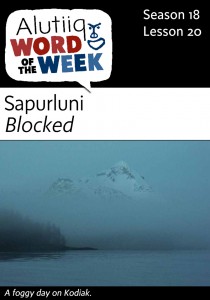Sapuraanga. – I am weathered in. (literally, “It blocked me.”)
The Alutiiq verb sapuluku literally means, “to block it”: to physically obstruct something or someone. For example, you could use this word on your boat, when a very low tide kept you from traveling through a channel, or to indicate that locked doors are keeping you from getting into your car. This verb can also be used for the Alutiiq phrase sapuraanga, which means, “I am weathered in.” In other words, the weather is blocking the airplane from picking you up. This useful, descriptive verb can also be changed into a noun, saputaq, to indicate something that is a blocker. Although the precise Alutiiq word for a fence has been lost, saputaq can be used to generally indicate a fence, a dam, or even a weir.
In prehistoric times, Alutiiq communities built fish fences, or weirs, out of stone. People piled cobbles in shallow rivers to form large V-shaped traps. Fish swam into these enclosures, which opened downstream, and were blocked from moving any further. Archaeologists find remnants of these stone weirs on Kodiak’s major salmon streams. In the historic era, Russian colonists introduced heavy log dams known as zapors. Fishermen used these large barricades in some regions of the archipelago until the early twentieth century. Today weir fishing is illegal around Kodiak. Instead, weirs are part of local fish management, installed by the Alaska Department of Fish and Game in area streams to count salmon as they return to spawn.

